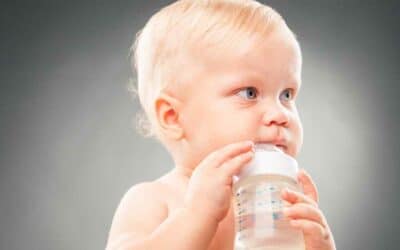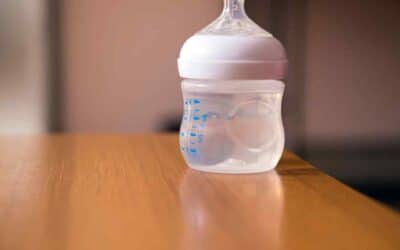As a parent, you want to provide your baby with the best care and nourishment possible. One important factor to consider is the presence of fluoride in water. Fluoride is widely added to most municipal water supplies in the United States, meaning that most of us consume some daily. However, the question remains: Is fluoride safe for babies and infants?
In this article, we will dive into this topic to provide the information you need to decide what is best for your baby’s oral health. We will also discuss the benefits of fluoride and alternatives such as ready-to-feed formula for those concerned about fluoride exposure. You can make an informed decision about the oral health benefits for your baby’s developing teeth with the correct information.
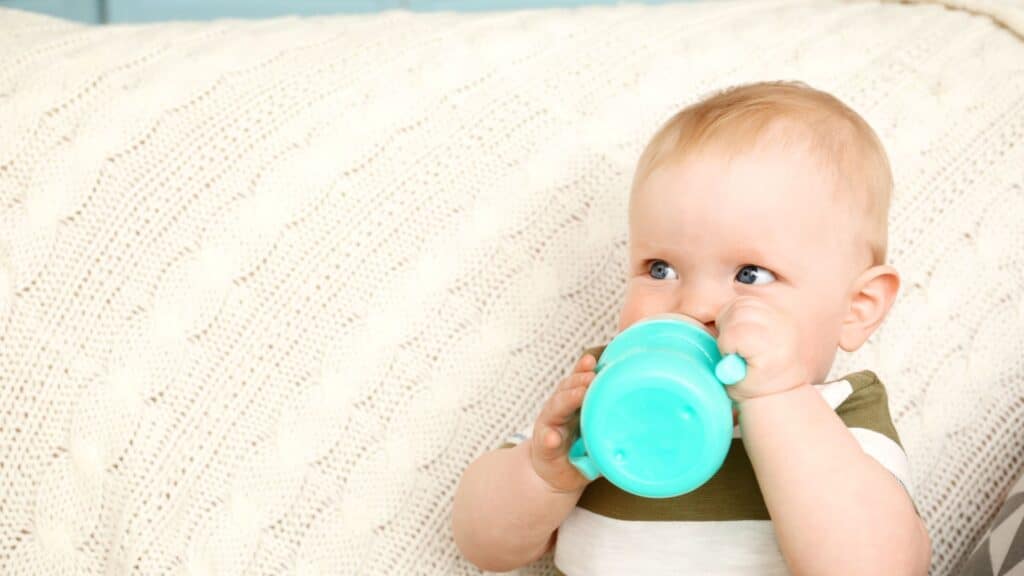
Understanding Fluoride in Water
Fluoride is a naturally occurring compound of fluorine and is added to many foods, including water, to help improve oral health. Fluoride helps prevent dental decay by strengthening tooth enamel and making it more resistant to the acids produced by decay-causing bacteria. Additionally, it can help reduce tooth sensitivity by acting as a desensitizer on the root surface of teeth.
Water fluoridation is adding fluoride to drinking water to achieve the recommended levels of fluoride exposure. This practice was first recommended by the United States Public Health Service in 1945 and was later strengthened in 1962. Today, about two-thirds of Americans drink fluoridated water, and research has shown that those who do have fewer cavities and better oral health than those who don’t.
While fluoride can benefit oral health, excessive fluoride exposure can lead to dental fluorosis, a cosmetic condition that can cause white spots or streaks on permanent teeth. To avoid excessive fluoride exposure, it is important to monitor the amount of fluoride in the water used to prepare infant formula. Formula-fed babies are at a higher risk of overexposure to fluoride since they consume formula regularly and can’t control how much they drink.
Fluoride is essential for maintaining good oral health, but it’s important to monitor exposure levels, especially in formula-fed babies. Drinking fluoridated water and fluoride toothpaste are excellent ways to promote oral health and prevent tooth decay. Still, it’s crucial to talk to your doctor or dentist about the right amount of fluoride for you or your child.
Fluoride can be found in many sources, including:
Drinking Water
Fluoride is often added to public drinking water supplies to improve dental health. The optimal fluoride concentration in drinking water typically ranges between 0.7 and 1.2 mg/L. This addition offers protection against tooth decay, particularly among children who might have limited access to dental care.
Toothpaste
Many kinds of toothpaste contain fluoride, aiming to strengthen the enamel on your teeth and reduce the risk of tooth decay. It’s important to use fluoride toothpaste, especially for children, as they are more prone to cavities. However, when it comes to very young children, use only a small amount of toothpaste, as ingesting excessive amounts of fluoride can lead to fluorosis in developing teeth.
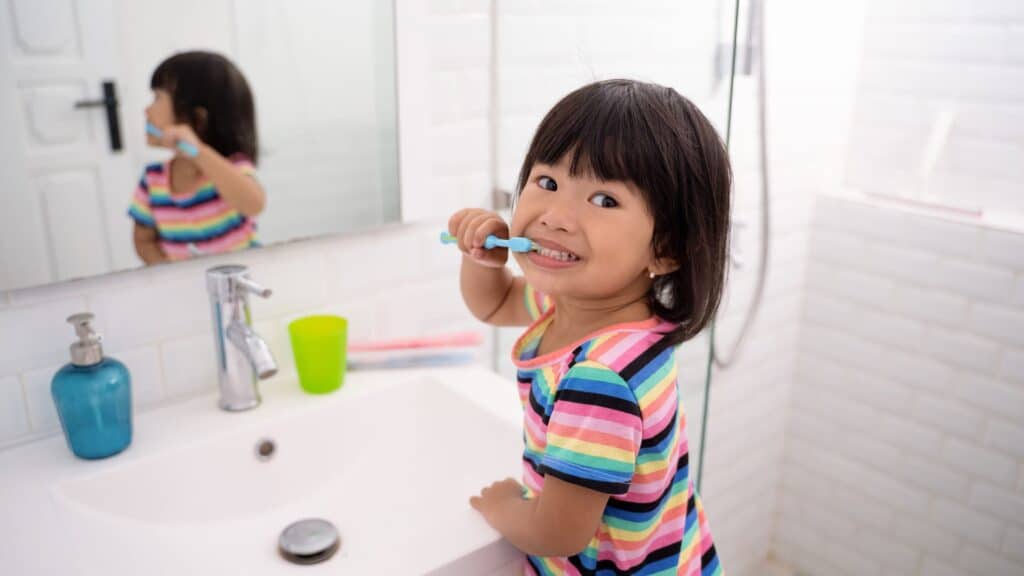
Mouthwashes
Some mouthwashes also contain fluoride, which can help to prevent tooth decay by strengthening the enamel on your teeth. Fluoride mouthwashes are particularly beneficial for individuals who are at a higher risk of cavities, such as those with a history of dental problems or who wear braces.
Dietary supplements
Fluoride supplements, such as drops or tablets, can be prescribed by a dentist or physician for individuals who do not receive enough fluoride from other sources. These supplements are typically recommended for children living in areas with low fluoride levels in the drinking water.
Seafood
Certain types of seafood, such as salmon, herring, and cod, naturally contain fluoride. Regular consumption of these fish can contribute to a person’s daily fluoride intake, in addition to providing other essential nutrients.
Tea
Tea plants naturally absorb fluoride from the soil, making tea a source of fluoride for some people. Black tea generally contains more fluoride than green tea. However, excessive consumption can lead to higher fluoride intake, potentially increasing the risk of fluorosis.
Processed foods and beverages
Some processed foods and beverages, such as fruit juices and powdered drink mixes, can contain fluoride due to being made with fluoridated water. These products can contribute to overall fluoride intake if consumed routinely.
Fluoride Intake in Babies
Fluoride intake in babies is an important factor in maintaining good oral health. When a baby drinks water containing fluoride, the amount absorbed into their body depends on the quantity and frequency of their water intake. Regular water consumption with high fluoride levels can help promote dental health. However, it may also lead to a condition known as fluorosis, which results in slight discoloration of the baby’s teeth or mild staining in more severe cases. Be mindful of your baby’s fluoride intake to ensure their dental health is adequately supported without the risk of fluorosis.
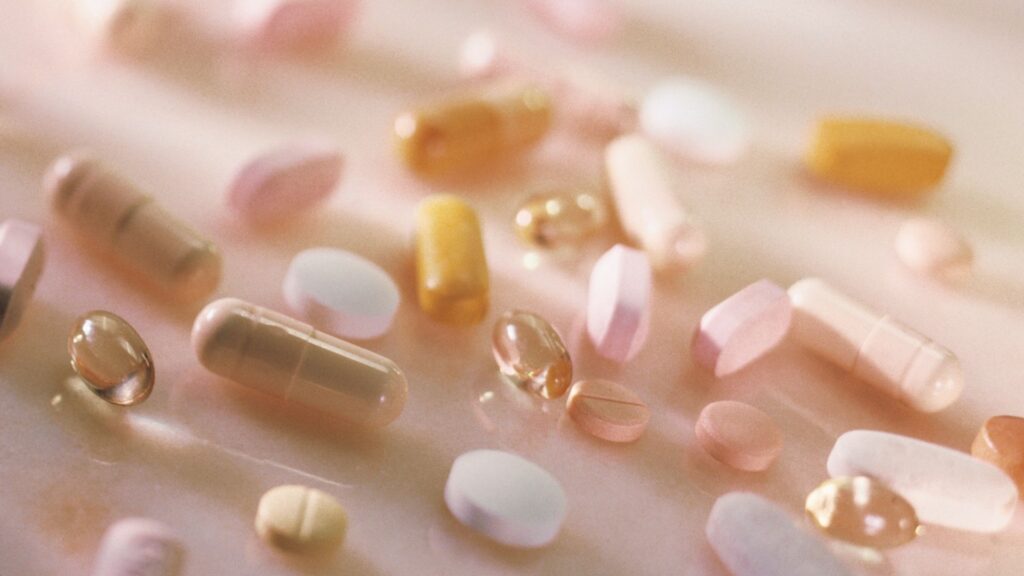
Water: Essential for Healthy Growth
Water is incredibly crucial for your baby’s growth and development. It aids in multiple physiological functions, including supporting the kidneys – organs that regulate water balance and waste filtration. Inadequate hydration could impede these critical processes, leading to potential waste accumulation in your baby’s body. The importance of urine output in babies cannot be overlooked; water plays a critical role in allowing babies to excrete waste substances through urine, consequently minimizing toxic effects.
Meanwhile, water also plays an essential role in maintaining your baby’s skin health. Babies are known for their soft and plump skin, a trait that owes much to high water content. When properly hydrated, your baby’s skin becomes more flexible and maintains its integrity, supporting healthier development of skin and underlying muscle tissue, and promoting overall growth from birth.
However, failure to hydrate adequately might result in grave health issues, among which dehydration is foremost. Dehydration sets in when the water level in the body drops below a requisite threshold. This condition can trigger a blood pressure drop in your baby and complicate their breathing, making it challenging to oxygenate their vital organs.
If left unchecked, this lack of hydration and resulting dehydration can escalate into severe health challenges. These can range from kidney failure to heat injuries like heatstroke, and seizures due to electrolyte imbalances. Chronic dehydration could also thwart physical and cognitive development in babies, setting them on a dire health trajectory at an early age.
So, it is paramount that your baby has access to adequate hydration. However, please note that breast milk or formula provides sufficient hydration for babies, and water as an additional drink should be included only beyond six months of age. Always consult a healthcare professional if you’re concerned about your child’s hydration.
Is It Safe for Infants to Drink Baby Water With Fluoride?
The safety of fluoride use for infants is a topic of ongoing discussion among healthcare professionals. As fluoride is effective in preventing tooth decay, it is found in various forms, such as fluoridated water, fluoride varnish, and fluoride drops. However, over-ingestion of fluoride in young infants can lead to mild fluorosis, causing tooth discoloration and pitting.
The American Dental Association (ADA) recommends avoiding fluoridated water for infants under six months of age to prevent excessive fluoride intake. In contrast, the American Academy of Pediatrics (AAP) suggests starting fluoride supplements after age two or three, only if the child has an increased risk of cavities or lives in an area with inadequate fluoride levels in the water supply.
Water and formula considerations: When it comes to mixing formula, using non-fluoridated water or bottled water formulated specifically for infants, which has low or no fluoride content, is the best option for babies younger than six months. As your baby transitions to solid foods, their risk of tooth decay will increase; maintaining good oral hygiene still requires close attention to fluoride intake levels.
Individual factors: It’s essential to consider various factors when determining your child’s fluoride intake, such as existing dental problems, the child’s dietary habits, and the local tap water’s fluoride levels.
To determine the best course of action for your child, consult a healthcare professional, such as a pediatric dentist or pediatrician, who can assess your child’s risk factors and provide tailored advice. Maintaining open communication with healthcare providers ensures that your infant benefits from fluoride’s protective qualities without the risk of fluorosis.
Baby Water with Fluoride: Pros and Cons
Here are the pros and cons of using baby water with fluoride.
Pros
Provides Essential Mineral
Fluoridated baby water provides an essential mineral, fluoride, crucial for the development of strong teeth and bones. It’s especially important for infants and toddlers as they start developing their primary teeth.
Strengthens Enamel and Prevents Cavities
Fluoride is known to strengthen the enamel on developing teeth. It makes the teeth more resistant to the acid attacks that can cause cavities. Thus, it boosts oral health from an early age.

Beneficial for Low Fluoride Areas
For families living in areas where the tap water has low fluoride levels or is not fluoridated at all, fluoridated baby water can provide the necessary mineral to support healthy teeth development in infants.
Safe Source of Fluoride for Young Babies
While fluoridated toothpaste offers dental protection, it is not suitable for infants who might swallow it. Fluoridated baby water is a safe and convenient source of fluoride for young babies who are not yet able to spit out toothpaste.
Cost-Effective Oral Health
Fluoridated baby water is a cost-effective solution to promote oral health. The cost associated with treating dental decay can be high, making prevention a more affordable approach.
Widely Available
Fluoridated baby water is widely available in markets and grocery stores, and online, which makes it a readily accessible option for parents. Its price is typically comparable to regular bottled water, making it an affordable choice for many families.
Smart choice for parents to protect their child’s oral health and ensure recommended daily dose of fluoride.
Cons
Leads to Fluorosis
Excessive fluoride consumption can lead to a condition called fluorosis, which causes discoloration and weakening of the teeth. In mild cases, fluorosis may appear as white streaks or spots on the teeth. More severe forms can cause the tooth surface to become rough and pitted and can result in brown stains.
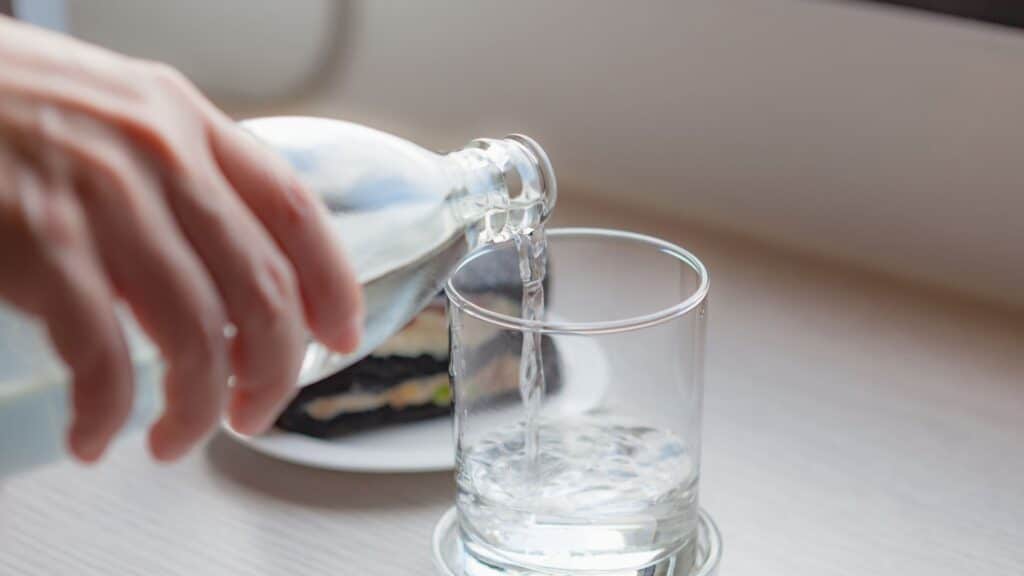
Developmental and Neurological Problems
Overexposure to fluoride, particularly in young children during their critical stages of brain development, can contribute to developmental and neurological problems. Some studies have indicated potential links between high fluoride exposure and decreased IQ, impaired cognitive development, and attention deficit problems.
Potential for Allergy or Intolerance
Some people may have an intolerance or allergy to fluoride, albeit rare. Symptoms can range from skin rashes to stomach problems. In such cases, fluoridated baby water might not be a suitable option.
Accessibility and Inequity in Health
Not all communities have access to fluoridated water, leading to disparities in oral health. This issue is particularly relevant in regions where municipal water supplies are not fluoridated, leaving residents without this protective benefit and potentially consequencing in higher rates of tooth decay in these populations.
Ongoing Debate on Optimal Fluoride Level
There is an ongoing debate about the optimal level of fluoride in drinking water and whether adding it to the water supply is the best way to ensure healthy teeth. The balance between sufficient fluoride to prevent tooth decay and excessive fluoride causing potential harm is delicate. Scientists, dentists, and public health professionals continue researching and discussing the best practices related to fluoridation.
When Can My Child Drink Regular Tap Water with Fluoride?
The answer is complex, as it depends on the age and development of your child. Generally speaking, it’s safe for most children to start drinking fluoridated tap water as soon as they can drink from a cup, typically around 6 months.
However, it’s important to talk to your pediatrician to determine the right time for your child, as they may have recommendations based on your child’s specific needs and health history.
Additionally, monitoring your child’s fluoride intake from other sources, such as toothpaste and food, is a good idea to avoid consuming too much and risking fluorosis.
Recommendations for Parents
If you’re concerned about how much fluoride your baby is getting from the water you use, don’t worry, there are alternatives.
The first is infant formula. If you’re breastfeeding, this is a good option for your baby’s teeth because it contains the same amount of fluoride as breast milk (1 milligram per liter). If you’re using a formula, look for one fortified with fluoride.
If you’re not breastfeeding or using a formula, look for foods soaked in fluoridated water, including rice cereal and cereals made with whole grains like oatmeal or wheat germ. You can also give your baby fluoridated toothpaste. Just be sure to supervise them while they brush!
Remember, every child is different, and what works for one may not work for another. It’s important to always consult with a pediatrician or dentist to determine the best course of action for your child’s individual needs.
Preventive Measures to Address Tooth Decay
Consider Breastfeeding Your Baby
Besides choosing fluoride-free water for mixing your child’s baby formula, breastfeeding is the best way to protect your child’s teeth. It’s highly advisable to provide your child with either human milk or infant formula until they reach six months. Afterward, consider giving them solid foods as you slowly train them to drink water independently.
Brush Them Thoroughly
Once you notice that your child’s teeth are slowly coming in, it’s best to brush them thoroughly twice a day to prevent tooth decay. You can also ask for directions from a dentist or a physician.
Begin Managing Their Oral Health Young
To prevent any instances of dental fluorosis, you need to start taking care of your dental health at a young age. For babies below 12 months, you can use a clean baby washcloth to wipe their gums gently. Then, you can smear fluoride toothpaste into their teeth to provide them with enough fluoride supplements.
Never Give Them Infant Formula When Putting Them to Sleep
Although it may seem like a brilliant idea, giving them infant formula when putting them to bed will only cause sugar to stick to their teeth’s enamel. Thus, making them prone to dental problems.
It’s also best not to let your child walk around with infant formula for long periods. But if your child asks for it, giving them a bottle of drinking water as an alternative is highly advisable.
Check if the Water is Fluoridated
Fluoridated water has many benefits, especially when it comes to dental health. But for a baby who’s less than a year old, fluoride in this type of bottled water may be too much.
So, when mixing your ready-to-feed formula for your baby, it’s best to get the baby water tested. Meanwhile, if you’re using well water to prepare infant formula, it’s highly advisable to seek advice from your baby’s doctor or dentist to know if it’s safe for your baby’s ready-to-feed formula.
Although you may consider it as potable drinking water, many underground water sources are left untreated, making it more prone to various harmful pathogens, especially with children younger than 12 months.
Start Regular Visits With The Dentist
You may start visiting your child’s dentist on their first birthday. The dental clinic can help monitor your baby’s teeth and even inform you about a few ways to care for their oral and dental health.
Refrain From Giving Excessive Amounts of Sweets
As your baby starts to grow, they’ll soon develop a taste for other sources of nutrition besides milk. So, if that happens, it’s highly advisable to refrain from giving them any starchy foods. Instead, you can provide them with sugar-free treats to prevent tooth decay.

What Type of Water Should You Give Your Baby?
Taking care of a baby requires vigilant attention to their needs, particularly what they consume, ensuring they’re well-hydrated, and safeguarding their health. A significant part of this care involves providing them with the most appropriate type of water.
Babies, particularly those reliant on baby formula, need the purest form of water for their consumption. Distilled or purified water is typically recommended for babies. These types of water undergo rigorous filtration and distillation processes, effectively eliminating impurities. They do not contain harmful substances or hard minerals that may impact a baby’s developing system. This quality can be especially important when preparing formula, where the purity of water can significantly influence the nutritional content and safety of the baby’s food.
If distilled or purified water isn’t readily available, an alternative involves boiling the accessible water source at home. This process aids in eliminating potential contaminants from the water, ensuring its safety for the baby’s consumption. To boil water for a baby’s use, it’s recommended that the water be brought to a rolling boil for around one minute, making sure it reaches a temperature where harmful bacteria and parasites can’t survive. After boiling, the water should be allowed to cool to a safe temperature before it is used.
Moreover, it may be advisable to avoid fluoridated water for infants as excessive intake of fluoride might lead to dental fluorosis, a condition that causes discoloration of the teeth. Despite fluoride’s benefits in preventing tooth decay, infants might be getting enough of the mineral from breast milk, formula, and infant foods.
Providing your baby with distilled, purified, or thoroughly boiled water is cardinal to maintaining their hydration and promoting their overall wellbeing. Fluoridated water, while beneficial for older children and adults, might warrant a cautious approach when it comes to infants, due to the risk of dental fluorosis. As always, your healthcare provider can offer guidance tailored to your baby’s specific needs, ensuring safe and healthy growth.
Conclusion
In conclusion, while fluoride plays a crucial role in maintaining dental health, healthcare experts warn about the possible impact of its excessive consumption. An overload of this mineral can lead to conditions like fluorosis, presenting as tooth discoloration and weakening. Additionally, high fluoride levels could negatively affect young children’s development, potentially leading to neurological issues. It’s essential to remember that while necessary for dental health, fluoride must be monitored closely in young children to prevent these complications. For these reasons, it is imperative to consult healthcare professionals – your pediatrician and dentist, in making a pivotal decision for your baby’s health. They can provide personalized recommendations based on several factors, including your child’s age, general health, dental history, and the fluoride levels in your local tap water.
Notably, they can weigh these factors against the potential risks and benefits of different fluoride sources. Their expertise could be invaluable in helping you wade through the various considerations surrounding this complex issue. Ultimately, the responsibility rests on your shoulders as a parent to make an informed decision about what’s best for your baby’s health and well-being. The choices you make in your child’s early life can lay the foundation for good oral health and overall well-being in the long run. Understanding the implications of fluoride intake is step one in ensuring you set your child up for a healthy life.
If you have any questions, please feel free to ask below. I’ll do my best to provide you with an answer.

